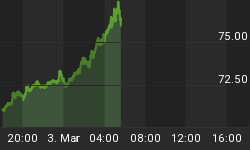With no legal gambling outlets on the mainland, millions of investors are rushing to buy stocks and mutual funds instead. Who needs baccarat tables and roulette wheels when you have China's stock market?
The Shanghai Composite "A" Share Index has gone up over 200% in the last 16 months placing Chinese stocks among the world's top performers. Before closing for the weeklong Chinese New Year holiday, the index briefly broke through the 3,000-point mark for the first time in history.
Chinese governmental authorities are expressing concerns over a stock market bubble as a growing number of small private investors are using loans for cars or houses to invest in stocks. On Jan 5, 2007, the People's Bank of China recently ordered another half-percentage increase to bank reserves to limit the money available for lending. Chinese banks now must set aside 9.5% of deposits for reserve purposes. On Jan 27, 2007 China's banking regulator ordered banks to cease retail borrowing for stock investments. The government body that oversees state-owned companies has recently warned people not to speculate on the stock market and investigations are underway looking at the use of credit card purchase for stocks. The Ministry of Finance has, for the first time, ordered that individuals with income of more than 120,000 yuan a year report stock trading profits. Some analysts speculate that this is a preparation for a capital gains tax.
Despite these policies, Shanghai's exchange continues to see record daily trading volumes and has moved as much as five percent on some days. China has 34,000 billion yuan (US$4,372 billion) in bank deposits that receive a meagre two per cent return. Now there is a tidal wave of money flowing into the stock market and market regulators have recently warned country's electronic trading system could destabilize.
Record numbers of individual brokerage accounts have been opened in recent months, reaching 80 million accounts in January, a ten percent increase over the previous year. Retail investors control 60% of the shares on the Shanghai market, a level that also appears to be increasing. By comparison, in Hong Kong, which lists a number of mainland Chinese companies, institutional investors account for 70% of daily transactions.
Among companies listed in both Shanghai and Hong Kong, the spread in valuations has increased widely since 2005. The Price/Earnings (P/E) ratio for companies listed on the Hong Kong market is close to 18, but the P/E ratio for the same companies in Shanghai is 33. The Chinese stock market has now become the most expensive in Asia, trading at 40 times 2005 earnings, compared to 16 in Hong Kong. The high P/E ratio is supported by expectations of 25% earnings growth for 2007.
This is in stark contrast to several years ago when the Shanghai Composite was the third-worst performing global benchmark after losing over half of its value from 2001 to 2005 amidst scandal, secrecy, corruption, and poor earnings. At the start of 2004, a man attempted to light himself on fire in front of the offices of China's stock market regulator in Beijing to protest about the collapse in share prices.
The exuberance is seen across the board, including those companies with poor business operations and/or financing. Tianjin Global Magnetic Cards jumped 137% after it failed to report quarterly earnings last April. Shanghai Haixin Group shares doubled over the next two months after its CEO was under investigation for "irregular activities". Shanghai New Huangpu Real Estate rose 111% in five months after the company was linked to a major corruption scandal involving the Shanghai pension fund. The Industrial and Commercial Bank of China, considered to be nearly insolvent only a few years ago, was at one point the second largest bank in the world behind Citigroup. It appears that for the time being, any news is being regarded as good news.
Cheng Siwei, vice-chairman of the National People's Congress has warned investors that "in terms of profits, returns and other indicators, 70 per cent of listed companies on the mainland do not meet international standards".
Many investors believe that luck and confidence in that the government won't permit share prices to collapse are more important than fundamentals. A 61-year-old retiree who gave her name as Miss Hou admitted that she didn't know how to choose a stock and purchased those companies who's names sound lucky. Let us hope that Miss Lou is in the minority.
What is the source of this widespread market speculation? It is the same "wave of liquidity" that is washing over the rest of the world. The Chinese central bank has accumulated the largest foreign currency reserve the world has ever witnessed from years of trade surpluses. These reserves are in turn, used to provide local currency to Chinese citizens who have taken to speculating on the stock market.
















